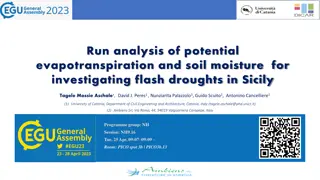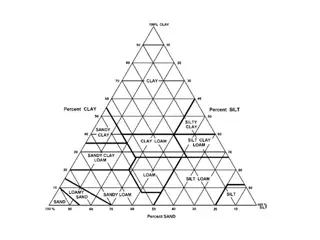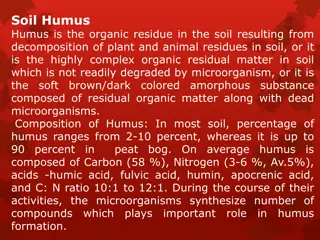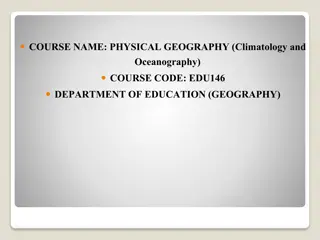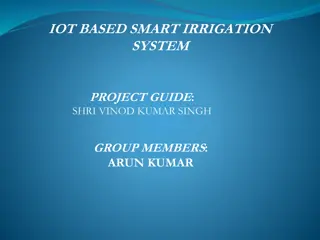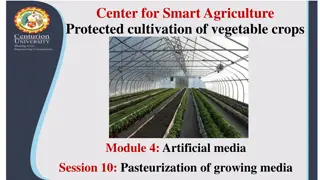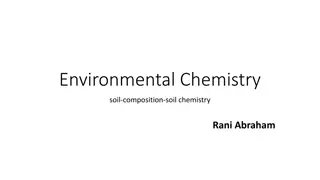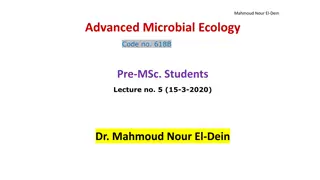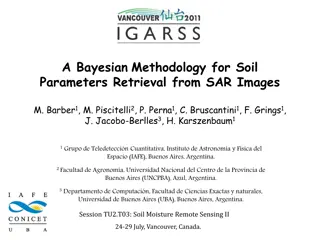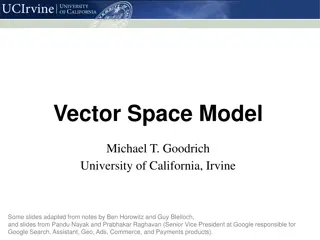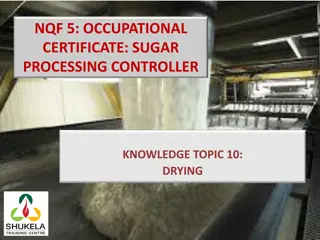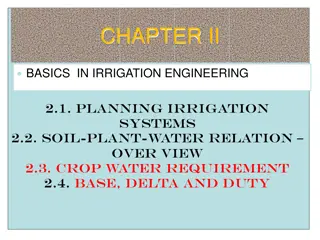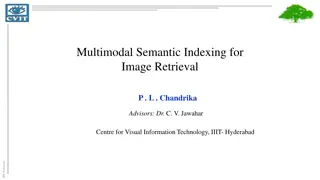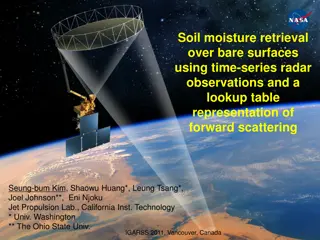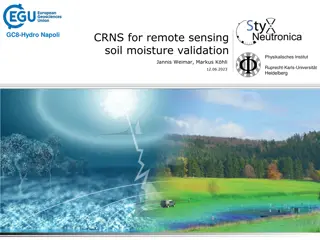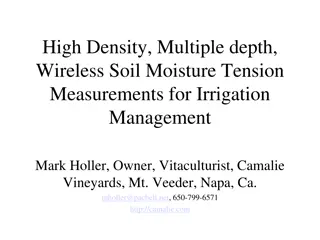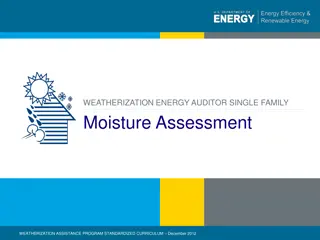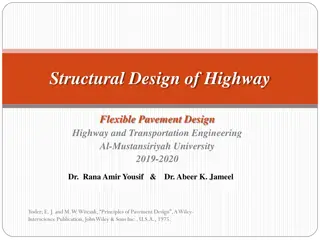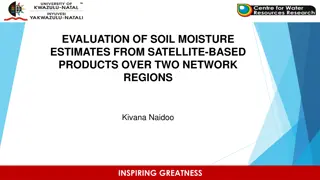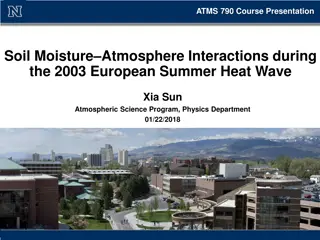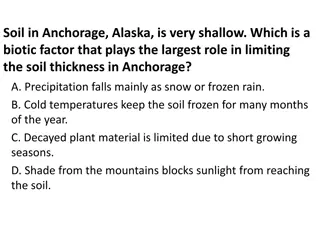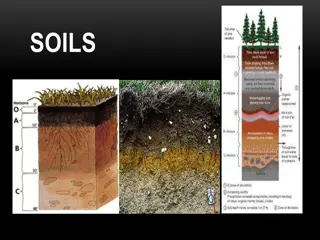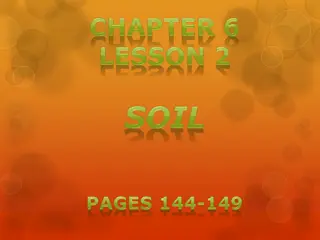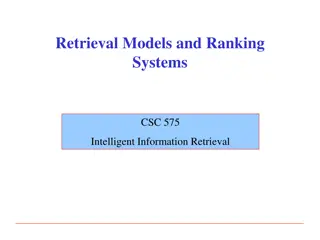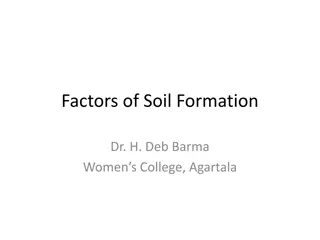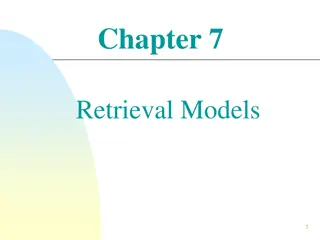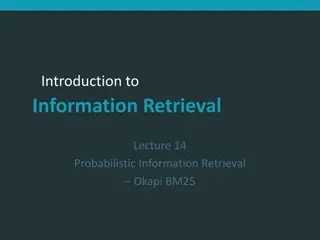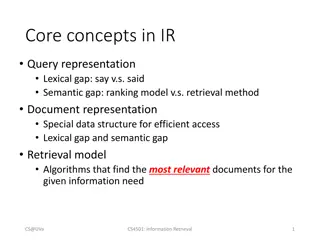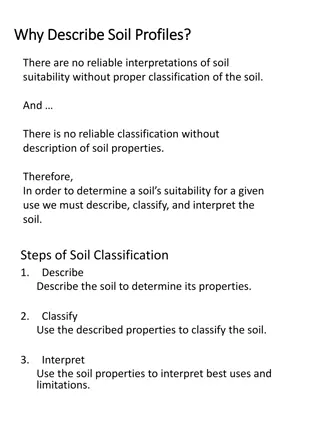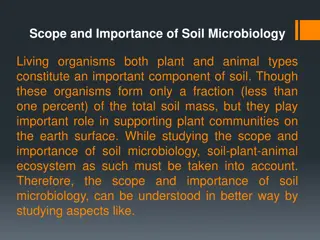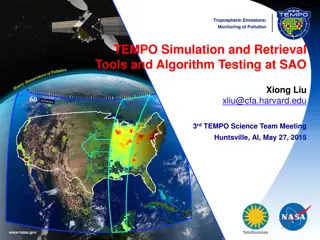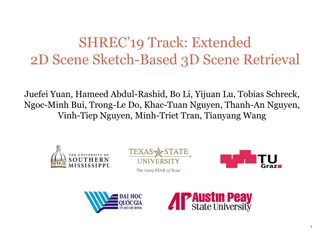Understanding Principles and Practices of Water Management in Agriculture
This course delves into the field water cycle, water movement in soil and plants, soil-plant-water relationships, water dynamics in the soil-plant-atmosphere system, soil composition, soil texture classification, permeability factors, density of soil solids, total porosity assessment, and energy asp
8 views • 62 slides
Evaluation of SPLASH and HRRR Soil Moisture Comparison
This study compares soil moisture data between the HRRR model and SPLASH observations during the 2022 warm season. It explores differences in soil moisture levels at various depths, evaluates responses to precipitation events, and drydown periods. The research focuses on analyzed data from HRRR Mode
3 views • 12 slides
Understanding Water Management: Principles, Practices, and Soil-Water Relations
Explore the principles and practices of water management in agriculture with a focus on water availability, nutrient relationships, and losses. Discover the physical classification of water, available water defined between field capacity and wilting point, soil water potential, and the soil-plant-at
6 views • 17 slides
Investigating Flash Droughts in Sicily Using Evapotranspiration and Soil Moisture Analysis
This study focuses on identifying flash droughts in Sicily by analyzing potential evapotranspiration and soil moisture anomalies. The research examines trends in evapotranspiration and soil moisture levels over the past 22 years, pinpointing a possible flash drought occurrence in eastern Sicily in 2
3 views • 29 slides
Enhancing Geography Learning Through Metacognitive Retrieval Practice
Students in Geography can improve their learning by applying metacognitive retrieval practice techniques. Retrieval practice helps activate prior knowledge, enhances memory retention, and fosters critical thinking skills. Metacognition, which involves planning, monitoring, and evaluating one's learn
1 views • 19 slides
Effective Methods for Soil Conservation
Methods to reduce soil erosion and promote soil conservation include terracing, contour planting, strip cropping with cover crops, alley cropping, agroforestry, windbreaks, and conservation tillage practices such as no-till and minimum tillage. These methods help in minimizing soil erosion hotspots
2 views • 11 slides
Understanding the Importance of Humus in Soil Health
Humus, the organic residue in soil, plays a crucial role in soil fertility and plant growth. It improves soil structure, retains water, stores essential nutrients, and promotes microbial activity. Factors like soil fertility, moisture, temperature, and pH influence the distribution and activity of s
0 views • 21 slides
Understanding Atmospheric Moisture in Physical Geography
Atmospheric moisture, in the form of water vapor, liquid water, and ice, plays a crucial role in shaping weather and climate. This course delves into the dynamics of atmospheric moisture, including its distribution, effects on weather patterns, and impact on various climatic factors such as precipit
0 views • 7 slides
Enhancing Information Retrieval with Augmented Generation Models
Augmented generation models, such as REALM and RAG, integrate retrieval and generation tasks to improve information retrieval processes. These models leverage background knowledge and language models to enhance recall and candidate generation. REALM focuses on concatenation and retrieval operations,
1 views • 9 slides
IoT Based Smart Irrigation System Project Guide
Monsoon-dependent Indian agriculture can benefit from an automatic irrigation system that prevents both over- and under-irrigation. By leveraging wireless technology, such as sensors for soil moisture, air humidity, temperature, and water levels, this project aims to optimize crop production by savi
4 views • 14 slides
Introduction to Information Retrieval and Web Search
Information Retrieval (IR) involves finding unstructured material, typically text documents, within large collections stored on computers to satisfy information needs. This process extends beyond web search to include email search, corporate knowledge bases, and legal information retrieval. The text
0 views • 53 slides
Soil Disinfestation Methods for Greenhouse Crop Production
Soil mixes for greenhouse production are carefully designed to optimize water retention and aeration. Proper management of artificial soil mixes can yield crops equal to those grown in topsoil. Sterilization of growing media is crucial, with techniques such as steam sterilization and fumigation comm
0 views • 11 slides
Understanding Soil Chemistry and Redox Reactions in Environmental Chemistry
Soil chemistry plays a crucial role in sustaining healthy soils by influencing nutrient availability through oxidation and reduction processes. Redox reactions in soil are impacted by factors like oxygen content and water presence, affecting nutrient supplies. The redox status of soil reflects its n
1 views • 92 slides
Understanding the Diversity of Microorganisms in Soil Ecosystems
Microorganisms in soil play crucial roles in soil fertility, nutrient cycling, and industrial product synthesis. They can also be pathogens causing diseases in plants and humans. Soil organisms are broadly classified into two groups: soil flora and soil fauna, consisting of various microorganisms li
0 views • 57 slides
Bayesian Methodology for Soil Parameters Retrieval from SAR Images
Surface soil moisture retrieval is crucial for various applications such as climatic modeling, hydrological studies, and agronomy. This work focuses on developing a soil moisture retrieval algorithm using the SAOCOM L-Band polarimetric SAR system in Argentina. Limiting factors include spatial variab
1 views • 16 slides
Ranked Retrieval Models in Information Retrieval
Ranked retrieval in information retrieval systems offers an ordered list of top documents in response to free text queries, eliminating the issues of Boolean searches like "feast or famine". Users benefit from not being overwhelmed by vast result sets, as only the top results are presented. Scoring
0 views • 38 slides
Understanding Moisture Measurement in Sugar Processing
This content delves into the importance of moisture measurement in sugar processing, specifically focusing on the drying process. It explains how moisture percentage is crucial for various calculations and efficiency assessments in the sugar production industry. The equipment and procedures used for
0 views • 12 slides
Basics of Crop Water Requirements in Irrigation Engineering
Understanding crop water requirements is crucial in planning effective irrigation systems. Crop water requirements are determined by factors such as evapotranspiration, soil conditions, and achieving maximum production potential. Effective rainfall, soil moisture storage, and groundwater contributio
0 views • 83 slides
Multimodal Semantic Indexing for Image Retrieval at IIIT Hyderabad
This research delves into multimodal semantic indexing methods for image retrieval, focusing on extending Latent Semantic Indexing (LSI) and probabilistic LSI to a multi-modal setting. Contributions include the refinement of graph models and partitioning algorithms to enhance image retrieval from tr
1 views • 28 slides
Soil Moisture Retrieval Over Bare Surfaces Using Radar Observations
This study focuses on retrieving soil moisture over bare surfaces using radar observations and a lookup table representation of forward scattering. The research aims to develop a non-empirical and simple method for accurate soil moisture retrieval without the need for ancillary information. Issues w
0 views • 14 slides
Advances in Remote Sensing for Soil Moisture Validation and Calibration
Cutting-edge methods like Cosmic-Ray Neutron Sensing (CRNS) and mobile measurements are revolutionizing soil moisture validation and calibration. From satellite-based techniques to local approaches, researchers are enhancing the accuracy and reliability of soil moisture data for various applications
0 views • 15 slides
Wireless Soil Moisture Tension Measurements for Irrigation Management
High-density, multiple-depth wireless soil moisture tension measurements were conducted in a vineyard in Napa Valley. The study found correlations between soil moisture tensions and leaf water potential, offering valuable insights for irrigation management. Utilizing a wireless sensor network, the s
0 views • 16 slides
Moisture Assessment in Weatherization Energy Auditing for Single Family Homes
This December 2012 curriculum focuses on moisture assessment in the weatherization energy auditing process for single-family homes. It covers analyzing symptoms of moisture problems, identifying sources, understanding moisture control strategies, and using assessment tools. The training aims to equi
0 views • 26 slides
Climate Models and Moisture Equilibrium in Flexible Pavement Design
Climate inputs like temperature and moisture play key roles in flexible pavement design. The heat transfer model evaluates frost action and temperature regimes, while moisture equilibrium models consider the interaction between soil suction and moisture content. Understanding these factors is crucia
0 views • 13 slides
Evaluation of Soil Moisture Estimates from Satellite-Based Products
The study evaluates soil moisture estimates from satellite-based products over two network regions. Soil moisture is crucial for the hydrological cycle, necessitating continuous monitoring due to its spatial and temporal variability. Remote sensing is utilized to gather information without physical
0 views • 5 slides
Soil Moisture-Atmosphere Interactions in the 2003 European Summer Heat Wave
This presentation discusses the significant impacts of soil moisture-atmosphere interactions during the 2003 European Summer Heat Wave, highlighting the abnormally hot weather, pavement buckling, and high-pressure systems that contributed to the extreme conditions. The images and diagrams illustrate
0 views • 27 slides
Understanding Soil Characteristics and Ecosystem Interactions
This content explores various aspects of soil characteristics, including factors influencing soil thickness, the role of bedrock in soil quality, optimal soil mixtures for plant growth, the impact of living organisms on weathering, and the formation of soil. It also discusses how animals can help so
0 views • 17 slides
Understanding Soil: Formation, Composition, and Impact on Plant Growth
Soil is more than just dirt; it plays a vital role in supporting plant growth. Formed through the weathering of rocks and organic activity, soil consists of rock fragments, clay, and organic material. The process of soil formation begins with the erosion of bedrock, leading to the development of dif
0 views • 12 slides
Exploring the Fascinating World of Soil: An Insightful Journey
Delve into the intricate composition of soil through a hand lens to uncover rocks, minerals, and humus. Discover the hidden elements like water, air, and living organisms that form the foundation of soil. Witness the decomposition process by bacteria and fungi, and explore the layers of a soil profi
0 views • 15 slides
Intelligent Information Retrieval: Models, Ranking, and Algorithms
Explore the intricacies of retrieval models, ranking systems, and algorithms in the field of Intelligent Information Retrieval. Learn about the construction of indices, matching and scoring processes, distinguishing between exact-match and best-match retrieval, ranking algorithms like Boolean matchi
0 views • 36 slides
Understanding Factors of Soil Formation and Soil Geography
Soil formation is a complex process influenced by factors like weathering, organic matter, and minerals. Soil geography studies soil distribution using geographic methods and cartography. Various definitions of soil highlight its importance for plant growth and as a natural body with distinct horizo
0 views • 20 slides
Understanding Retrieval Models in Information Retrieval
Retrieval models play a crucial role in defining the search process, with various assumptions and ranking algorithms. Relevance, a complex concept, is central to these models, though subject to disagreement. An overview of different retrieval models like Boolean, Vector Space, and Probabilistic Mode
0 views • 56 slides
Understanding Probabilistic Information Retrieval: Okapi BM25 Model
Probabilistic Information Retrieval plays a critical role in understanding user needs and matching them with relevant documents. This introduction explores the significance of using probabilities in Information Retrieval, focusing on topics such as classical probabilistic retrieval models, Okapi BM2
0 views • 27 slides
Understanding Core Concepts in Information Retrieval: Lexical and Semantic Gaps, Retrieval Models, and Algorithms
Explore the core concepts in Information Retrieval (IR) including lexical gaps like 'say' vs. 'said', semantic gaps, ranking models vs. retrieval methods, special data structures for efficient access, and algorithms for finding relevant documents. Understand the differences between IR and databases,
0 views • 46 slides
Importance of Describing Soil Profiles for Soil Suitability Analysis
Proper classification and interpretation of soil properties through describing soil profiles are essential in determining soil suitability for various uses. Soil classification involves describing, classifying, and interpreting soil properties to understand the best uses and limitations of the soil.
0 views • 5 slides
Introduction to Information Retrieval and Web Search
Information Retrieval (IR) involves finding unstructured material, usually text documents, to satisfy information needs from large collections. This process is essential for various applications like web search, email search, and corporate knowledge bases. The evolution of unstructured vs. structure
0 views • 15 slides
Understanding the Scope and Importance of Soil Microbiology in Ecosystems
Soil microbiology plays a significant role in supporting plant communities and maintaining soil health. Living organisms, both plant and animal types, form only a small fraction of soil mass but are crucial for processes like plant growth, organic matter decomposition, humus formation, and biogeoche
0 views • 14 slides
TEMPO Simulation and Retrieval Tools Testing at SAO
TEMPO Simulation and Retrieval Tools and Algorithm Testing at SAO involved performing retrieval sensitivity studies, adapting VLIDORT for TEMPO radiance spectra, utilizing TEMPO SNR model for optical transmission calculations, and using climatological a priori data for trace gases. The studies focus
0 views • 4 slides
SHREC19 Track: Extended 2D Scene Sketch-Based 3D Scene Retrieval Overview
The SHREC19 Track focuses on Extended 2D Scene Sketch-Based 3D Scene Retrieval, aiming to retrieve relevant 3D scene models using scene sketches as input. This challenging research direction addresses the semantic gap between 2D sketches and accurate 3D scene models, with vast applications in 3D sce
0 views • 29 slides
Requirements for Semantic Biobanks and Global Biobank Data Retrieval
Explore the critical aspects of semantic interoperability in biobanking, highlighting the need for formal ontologies, comprehensive annotations, and model of meaning data. The (Generalized) Biomedical Retrieval Scenario underscores the importance of effective resource retrieval based on content-base
0 views • 16 slides



